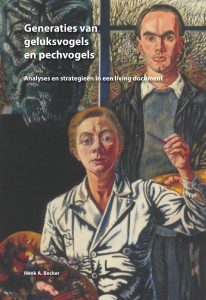On Generations ~ Over Generaties
 Background information ~ Achtergrond
Background information ~ Achtergrond
Karl Mannheims “Problem der Generationen” ~ 80 Jahre danach
Zusammenfassung
Mannheims Generationenbegriff aus seinem 1928 und 1929 erschienen zweiteiligen Artikel über „Das Problem der Generationen“ muss in der Gegenwart teilweise überarbeitet werden. Eine Unterscheidung zwischen Kohortengenerationen und Typologiegenerationen muss ausgearbeitet werden, da seit 1957 Stereotype von Generationen allgemein verbreitet wurden. Auch eine Differenzierung zwischen allgemeinen, partiellen und spezifischen Generationen ist notwendig geworden. Die gegenwärtige soziologische Generationenforschung kann häufig Methoden der Epidemiologieforschung anwenden, wie beispielsweise die Verwendung von Zufallsmodellen. Datenarchive erweitern die Möglichkeiten der Generationsforschung. Die Formativperiode im Lebenslauf ist nicht nur soziologisch, sondern auch biologisch und psychologisch abgegrenzt. Religionsforschung und Familienforschung können von der Generationenforschung profitieren.
Schlagworte: Kohortengeneration; Typologiegeneration; Partielle Generation; Spezifische Generation; Generationsforschung in der Familienforschung
Full text (German): http://henkbecker.com/problem_of_generations.php
Henk A. Becker & Lies van Rijssen ~ Bloemlezing uit de literatuur over afstandsonderwijs (2010)
PDF: http://henkbecker.com/upload/background_book/Bloemlezing.pdf
Symposium Universiteit Utrecht 2006
Programme Science Court
Background study: ‘Verwondering, Verlichting en Schepping in meerder vormen’
Report: ‘Evolution and Creationism’ (case: ‘creativity in science’)
Reports about TRIZ
Meer creativiteit ja, maar niet in plaats van wetenschap
De oorsprong van TRIZ en I-TRIZ
TRIZ-based tools for knowledge creation
TRIZ elects a president
Article about ‘Interdisciplinary Research and Creativity’ (final case Science Court)
Presentations
Becker – Creativiteit in meervoud
Dekker – Geloof en wetenschap
Nienhuis – Requis
Dieks – Intelligent design
De Kempenaer – TRIZ
Stroebe – How to stimulate scientific creativity through funding
Schins – Intelligent design
Hoekstra & Horzinek – Creativiteit in de wetenschap en kunst
Conclusions
PDF & Powerpoints: http://henkbecker.com/symposium.php
News ~ Nieuws
A new wave of change is expected in the working world, as Generation Z – those born in 1995 or later – enter the workplace and millennials occupy management positions this year.
In the audio, Azania Mosaka speaks to Trend Translator Sue Morris and takes a look at how millennials have renewed the organisational culture of businesses and the benefits thereof.
Monika Palmberger ~ How Generations Remember. Conflicting Histories And Shared Memories In Post-War Bosnia And Herzegovina
My study, in concentrating on the role of generational positioning, reveals that past experiences inform present stances, but also shows that it is the actor in the present that gives meaning to the past. This is also true for narratives of the past that are passed on from older to younger generations, and are then scrutinised and contextualised by the latter. It is suggested that people’s sense of continuity can deal with the inconsistencies that arise with this transfer between generations. It is this field of tension between collective and personal, and between persistence and change that is central in the discussion of generational positioning in this book.
Lees: Renate van der Zee ~ De pampergeneratie: verwend, gekoesterd en daardoor dóódongelukkig
De jongeren van nu zijn te beschermd opgevoed. Hun ouders namen alle mogelijke obstakels weg, waardoor ze niet weerbaar genoeg zijn geworden. Eén krijs en ze kregen ijs. Als ze eenmaal volwassen zijn, wreekt dit zich in de vorm van depressies, chronische vermoeidheid en burn-outs.
The Erasmus Generation
We are the Erasmus Generation, and we speak for a new Europe. Our vision is of a growing and united Europe, forged by the fall of the Berlin wall, the end of the east-west divide, and the explosion of connections in every direction. We are the Internet generation. We are products and protagonists of the struggle for a European society where values and policies unite while borders fade.
The Erasmus Generation has learned how to live in a land without borders. We have been educated to appreciate differences, and we are thrilled by the speed of integration and the potential of a united and inclusive European society. We no longer fear that we may lose our identity or national traditions; we know that our polity is strengthened because we are different from one another. Our land stretches from the Mediterranean to the North Sea. It can become a golden bridge between west and east, north and south. Europe can be all of this, and we know it.
– See more at: http://www.garagerasmus.org/appeal-to-the-erasmus-generation.html